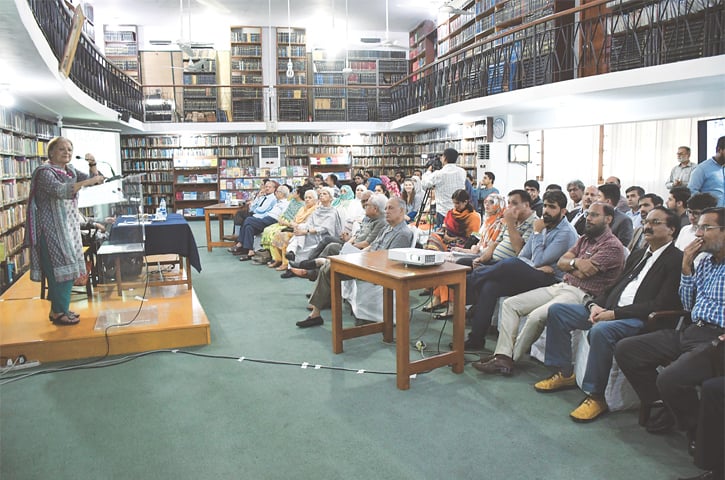
KARACHI: In order to resolve the current crisis in Kashmir, Pakistan should engage in active diplomacy. This was one of the points raised by university students who took part in a youth conclave to discuss the recent developments in India-held Kashmir at an event organised by the Pakistan Institute of International Affairs (PIIA) on Thursday evening.
The programme began with PIIA’s chairperson Dr Masuma Hassan giving the background of the situation. She showed maps of the region and then informed the audience about articles 370 and 35A of the Indian constitution. She said Article 370 gives autonomous status to Kashmir under which Kashmir had its own flag, assembly, local laws, and complete control over its area except in three fields: defence, foreign affairs and communications. That has now been scrapped. Article 35-A, she said, protected land rights of the Kashmiri people. It has also been scrapped. She then showed video clips of two Indian women who recently spoke against the Indian government’s decision.
After that, students were invited to the podium to speak on the topic. The first was Turfa Irfan of the Federal Urdu University of Arts, Science and Technology (FUUAST). She said, “We cannot trust India. If we withdraw our army, will India hold a referendum there?” No one should think about occupying that piece of land [Kashmir]. We should be thinking about providing their people with basic facilities and amenities.
Momina Jamil of FUUAST said what India is doing in Kashmir shouldn’t surprise anyone. We knew that the Modi government with its second term would make life difficult for Muslims of India by making anti-Muslim laws. But there is a bright side to it: India is being divided by Modi, and there’s a civil war-like scenario there. Our government, on the other hand, was caught napping. Political governments in Pakistan have seldom tried to resolve the Kashmir issue. Ms Jamil also gave three suggestions: (1) Pakistan should talk to the Islamic world and convince them not to trade with India. (2) We can shift our national security policy to economic security policy because we have trust in our armed forces. (3) We need bold and strong diplomacy.
University students discuss how to tackle the Kashmir crisis
Yusra Humayun of Habib University said every country in the world is in a state of economic crisis; it’s an economic war we’re fighting. In order to understand the foreign policy of a country, understanding the agenda of their ruling party is important. India is in a state of panic. Indirectly they’re trying to do ethnic cleansing, immobilising people belonging to a religion. [But] it’s not about religion. It has a power dynamic. Recently, Saudi Arabia has signed a [financial] deal with an Indian company. No one spoke up when things went wrong in Palestine. When Modi came back everybody knew he was coming back with an agenda.
Wasimuddin of Karachi University drew attention of the audience towards the atrocities committed by Indian forces in Kashmir, such as the use of cluster bombs, a severe violation of human rights. He argued while there were some voices being raised against the Indian government, what about the rest of the people in India? He also talked about the Parliamentary Kashmir Committee in Pakistan and inquired what had Maulana Fazlur Rehman [who had formerly headed the committee] been doing all along? “We need to do something which is tangible.” We have the army, think tanks etc. On diplomatic level we can do a lot. Trump has asked Pakistan and India to negotiate and not go anywhere else. The young man asked, where else can we go?
Yasmeen Ashar, a researcher, said one of the reasons that India cites for taking the step is that it’s fighting terrorism. We should tell the world about how we have been fighting terrorism, especially in Waziristan. India also took the step because it wanted to act as a spoiler in the Afghan peace process because it had been sidelined in it. We should be pragmatic in dealing with Muslim countries, especially the UAE, because India has a large number of expats there. We should constantly propose diplomacy. It doesn’t help when our prime minister says there is no use talking to India.
Zohaib Hussain, Bareera Butt and others also spoke.
Published in Dawn, August 23rd, 2019













































Dear visitor, the comments section is undergoing an overhaul and will return soon.